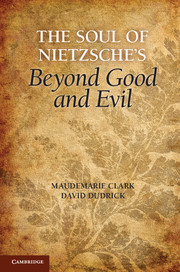Book contents
- Frontmatter
- Contents
- Note on Texts and Citations
- Introduction
- Part One The Will to Truth and the Will to Value
- 1 Setting the Stage
- 2 The “Magnificent Tension of the Spirit”
- 3 Philosophy and the Will to Value
- 4 Science and the Will to Truth
- 5 Reconciling the Will to Truth and the Will to Value
- Part Two The Will to Power
- Acknowledgments
- Bibliography
- Index
1 - Setting the Stage
Nietzsche’s Preface
Published online by Cambridge University Press: 05 August 2012
- Frontmatter
- Contents
- Note on Texts and Citations
- Introduction
- Part One The Will to Truth and the Will to Value
- 1 Setting the Stage
- 2 The “Magnificent Tension of the Spirit”
- 3 Philosophy and the Will to Value
- 4 Science and the Will to Truth
- 5 Reconciling the Will to Truth and the Will to Value
- Part Two The Will to Power
- Acknowledgments
- Bibliography
- Index
Summary
That BGE is much more like a philosophical treatise than it appears to be is already suggested by the striking similarity between its preface and that of Kant’s Critique of Pure Reason, which is widely taken to be the greatest philosophical treatise in Nietzsche’s native language. Nietzsche’s preface certainly does not sound or read much like Kant’s. It is shorter and livelier, and the writing is brilliant. Most of all, its tone differs from Kant’s, which is utterly serious from beginning to end, whereas Nietzsche begins with a joke or jibe. And whereas Kant places before his preface an exceedingly reverent-sounding dedication to his patron, Nietzsche has no patron (but note GM I: 12), and his tone, at least at the beginning, is irreverent. Despite these and other stylistic differences, the content of Nietzsche’s preface – what he is actually saying in it – is very similar to Kant’s. Each author presents us with a story of the history of philosophy and situates his book as its rightful culmination. As we will see in Chapter 3, Nietzsche positions himself as Kant’s rightful heir later in the book. Nietzsche’s story of the history of philosophy is not identical to but is rather a variation on Kant’s: it involves three main themes, each of which is illuminated by comparison to Kantian ones.
- Type
- Chapter
- Information
- The Soul of Nietzsche's Beyond Good and Evil , pp. 13 - 29Publisher: Cambridge University PressPrint publication year: 2012

